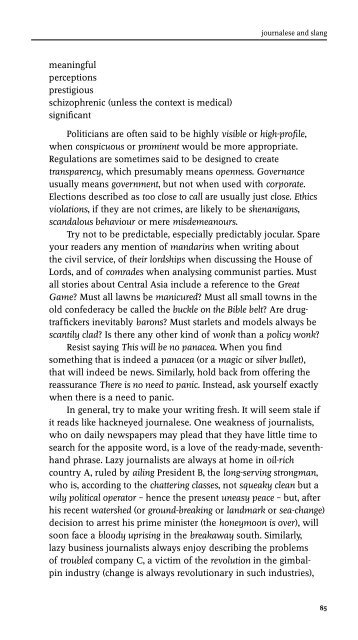Economist Style Guide - Redress Information & Analysis
Economist Style Guide - Redress Information & Analysis
Economist Style Guide - Redress Information & Analysis
Create successful ePaper yourself
Turn your PDF publications into a flip-book with our unique Google optimized e-Paper software.
meaningful<br />
perceptions<br />
prestigious<br />
schizophrenic (unless the context is medical)<br />
signifi cant<br />
journalese and slang<br />
Politicians are often said to be highly visible or high-profi le,<br />
when conspicuous or prominent would be more appropriate.<br />
Regulations are sometimes said to be designed to create<br />
transparency, which presumably means openness. Governance<br />
usually means government, but not when used with corporate.<br />
Elections described as too close to call are usually just close. Ethics<br />
violations, if they are not crimes, are likely to be shenanigans,<br />
scandalous behaviour or mere misdemeanours.<br />
Try not to be predictable, especially predictably jocular. Spare<br />
your readers any mention of mandarins when writing about<br />
the civil service, of their lordships when discussing the House of<br />
Lords, and of comrades when analysing communist parties. Must<br />
all stories about Central Asia include a reference to the Great<br />
Game? Must all lawns be manicured? Must all small towns in the<br />
old confederacy be called the buckle on the Bible belt? Are drugtraffi<br />
ckers inevitably barons? Must starlets and models always be<br />
scantily clad? Is there any other kind of wonk than a policy wonk?<br />
Resist saying This will be no panacea. When you fi nd<br />
something that is indeed a panacea (or a magic or silver bullet),<br />
that will indeed be news. Similarly, hold back from offering the<br />
reassurance There is no need to panic. Instead, ask yourself exactly<br />
when there is a need to panic.<br />
In general, try to make your writing fresh. It will seem stale if<br />
it reads like hackneyed journalese. One weakness of journalists,<br />
who on daily newspapers may plead that they have little time to<br />
search for the apposite word, is a love of the ready-made, seventhhand<br />
phrase. Lazy journalists are always at home in oil-rich<br />
country A, ruled by ailing President B, the long-serving strongman,<br />
who is, according to the chattering classes, not squeaky clean but a<br />
wily political operator – hence the present uneasy peace – but, after<br />
his recent watershed (or ground-breaking or landmark or sea-change)<br />
decision to arrest his prime minister (the honeymoon is over), will<br />
soon face a bloody uprising in the breakaway south. Similarly,<br />
lazy business journalists always enjoy describing the problems<br />
of troubled company C, a victim of the revolution in the gimbalpin<br />
industry (change is always revolutionary in such industries),<br />
85


